|
|  |
|
February 11, 2025
|
|
UK - Global milk supplies forecast: growth to return in 2025
According to latest estimates, global milk production across the key producing regions is expected to come back to growth with a small increase of 0.6% year-on-year. This is higher than the 0.1% decrease recorded in 2024. The growth should come from every region, bar Australia (which will be highly weather dependent).
Overall, dairy markets in the latter half of 2024, into early 2025 have been tending towards coming back into growth following a period of higher milk prices and cheaper feed costs. Disappointing Chinese import demand in 2024 has now begun to ease, with a small increase in imports recorded. We have also seen good growth from other importing regions such as Southeast Asia and the Middle East. The global economic situation has been less depressed than in the immediate aftermath of the pandemic years. There are currently some vulnerabilities emerging which could have an impact on global economic growth. A more protectionist US could make ripples in global demand. Some further vulnerabilities in diseases such as BTV in Europe, a Foot and Mouth outbreak in Germany, and avian influenza in the US could also stem supplies.
Read more about the global milk supplies forecast on AHDB's website
|
|
|
|
|
UK - Shropshire University dairy herd awarded The 2024 NMR RABDF GOLD CUP
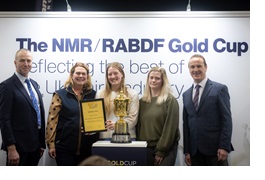 (RABDF Chairman Robert Craig, Kate Robinson, Alice Sault, Becky Yarnold (HA Dairy), Mark Frankcom, MD NMR.)
(RABDF Chairman Robert Craig, Kate Robinson, Alice Sault, Becky Yarnold (HA Dairy), Mark Frankcom, MD NMR.)
Shropshire-based Haper Adams University Future Farm, Newport has been crowned NMR RABDF Gold Cup winner 2024. The cup, and other Gold Cup awards, were presented at Dairy-Tech on February 5, 2025, at Stoneleigh, Warwickshire.
Kate Robinson and her team manage the 400-cow Holstein herd at Harper Adams, which is part of the University's Future Farm. The dairy operates on 227 hectares and is run by five full-time staff. Although the dairy unit is involved in research and teaching activities, it is expected to perform commercially and achieve exceptional industry-based standards, and also to demonstrate good practice. Staff are vital ingredient in achieving the unit's goals.
The all-year-round calving herd is fully housed and fed a TMR. Breeding moved from a production focus to health and longevity in 2018, to improve lifespan and reduce the herd's replacement rate, and to breed a more efficient cow. Average milk yield is 12,248kg at 3.85% fat 3.19% protein on three times a day milking. Milk from forage is currently 34%, or 3,864 litres of milk.
Four further awards were made to herds meeting the Gold Cup criteria:
The Chris May Memorial Award, for the Gold Cup qualifying herd with the highest lifetime daily yield (LDY), was awarded to R D Horton from Broad Hinton in Wiltshire. Owned by Robert, with sons Tom and James involved in the business, this 350-cow Hinton Herd of pedigree Holsteins achieved an average lifetime daily yield of 22.5kg of milk per day in the qualifying year ending September 2023. This achievement reflects the herd's all round performance, combining good production, fertility, health and longevity.
The NMR Silver Salver, awarded to the Gold Cup qualifying Holstein herd with the highest combined fat and protein production, was won by Marshall and Law partners from Woodside Farm, Derbyshire for the second year running. The 220-cow all-year-round calving Overseal Holstein herd produced 1,026kg of fat and protien in the year ending September 2023. This herd consistently ranks in the top three NMR production herds, and is currently producing 13,600kg of milk.
The Hunter family from Shotts, Lanarkshire complete a hat trick in being awarded the Lilyhill Cup for the third year running. This award is for the Jersey herd with the highest combined fat and protein, and the Hunter's 200-cow Clydevalley Jersey herd farmed by Robert & Lorraine Hunter in partnership with their son Mark produced 866.77kg a cow.
Winner of the Chairman's Cup, for the Gold Cup qualifying herd of a breed other than Holstein or Jersey, with the highest combined weight of fat and protein, was awarded to the Cowhill Trust Muirside, Dumfries. Run by Stuart Neish, this all-year-round calving herd of 210 Red and White Holsteins and Ayrshire achieved a combined weight of fat and protein of 763.06kg a cow.
Other finalists in the 2024 NMR RABDF Gold Cup were:
- PJ & PE Ashley & Son Meadow Bank Farm, Condover, Shropshire
- E.A Lovatt & Son, Broughton Astley, Leicester
- Newley Farm, Bishop's Hull, Taunton, Somerset
- G E Oakley and Sons, Wirswall Farm, Whitchurch, Cheshire
- Matthew and Andrew Rowe, Tredinnick Farm Ltd, Liskeard, Cornwall
|
|
|
|
|
UK - Falling short of carbon targets will significantly impact farmers and the industry
Dairy farmers need greater financial incentives in order for them to meet the 30% carbon reduction by 2030 targets that have been set by government and retailers.
That was the message from Kite Consulting's Becki Reay speaking at the DairyHub during this year's DairyTech, who voiced that the industry will have to increase efforts to meet these targets to avoid pressure to reduce production and consumption.
In 2020 Kite Consulting published a report into what levers dairy producers would need to pull to reduce their carbon footprint in the following decade. While some farmers have made real progress, encouraged by the milk processor, carbon data, as seen in the model below, shows the industry is not on track to meet its target. With many already activating the 'low hanging fruit' of carbon-reducing activity, the amount of work ahead should not be underestimated.
"Those farmers not engaging with carbon reduction might find they do not have access to new contracts or even keep their existing milk contracts. Alternatively, they might receive a lower milk price, and with the growth of green financing may have more expensive borrowing costs or no access to borrowing at all," said Becki.
"In order to leverage quicker change, processors will need to pay for carbon reduction - the figures as well as the actions and outcomes," she added. "We need to be in a position where farmers with lower carbon footprints are rewarded for the actions they have already taken as well as incentivised to take the actions that will reduce it further.
"In some cases retailers are funding, through processors, activity that reduces carbon footprint without increasing production efficiencies because they need to show faster progress towards their 2030 targets. The willingness to pay for carbon reduction is there, it just needs to channel it in the right direction.
"We have the data to show improving feed efficiency and genetic improvement, through genomic testing and breeding, will lead to the greatest carbon reductions for most farmers. The sooner all farmers are given the confidence that they will be rewarded for their carbon score and actions taken which directly reduce it, the sooner we will see farmers focus efforts and deliver the accelerated reductions needed to meet 2030 targets. With only five years until then, and a need to speed up progress, it can't come soon enough," Becki said.
Carbon Footprint: Progress at Current Rate Compared to Target
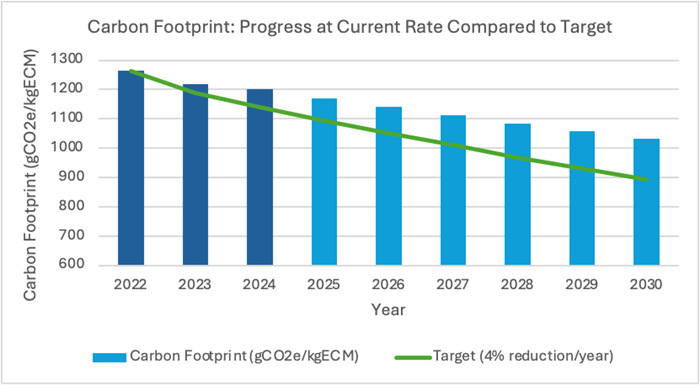
Source: Intellync data
|
|
|
UK - Scottish dairy farm sought for national programme
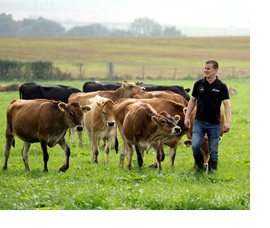 The AHDB is seeking a dairy farm in Scotland to join its Strategic Dairy Farm programme. Farmers who are interested in driving innovation, sharing best practices, and confident in hosting on-farm and virtual events are encouraged to get in touch. Successful applicants will be appointed for three years and will have the opportunity to collaborate with industry experts on their chosen topics, encouraging peer-to-peer learning.
The AHDB is seeking a dairy farm in Scotland to join its Strategic Dairy Farm programme. Farmers who are interested in driving innovation, sharing best practices, and confident in hosting on-farm and virtual events are encouraged to get in touch. Successful applicants will be appointed for three years and will have the opportunity to collaborate with industry experts on their chosen topics, encouraging peer-to-peer learning.
A steering group comprising of AHDB representatives, peers, and industry experts will offer a network of support and help to identify goals and develop a tailored plan for each farm. The experiences of participating farms will be shared with other farmers, enabling them to learn from your insights.
Doreen Anderson, AHDB's Senior Knowledge Exchange Manager for Dairy, stated: "Our goal is to enable farmers to explore new concepts and integrate changes within their businesses. This initiative presents an excellent opportunity for collaboration with local farmers and industry experts to implement positive transformations on their farms."
The AHDB Strategic Dairy Farm programme aims to improve business resilience and performance across the dairy sector. It is a farmer-led and farmer-driven initiative that showcases best practices and practical demonstrations, providing farmers with innovative ideas to enhance their own operations.
The existing farms in the programme include those with year-round and block calving systems, as well as fully housed and extensively grazed operations.
Gareth Owen of Potstown Farm, a strategic dairy farmer since October 2021, manages a 451-acre farm with 260 cows and 240 youngstock with his brother David and father. He said, "We joined the strategic dairy farm programme to enhance our farm's performance and deepen our understanding of genetics and genomics with our herd of purebred Holsteins and Jerseys.
"The journey has been incredibly rewarding, allowing us to share our experiences and learn from fellow farmers. We've also discovered innovative ways to optimise our existing buildings for youngstock and maximise our infrastructure's potential.If you're looking to improve your farm and work on your business goals, we highly recommend joining this programme. The opportunity and knowledge gained has offered us a lot of insight into our own business."
Join AHDB's network of like-minded farmers who are committed to improving their farm businesses. To apply, please contact Doreen Anderson at Doreen.anderson@ahdb.org.uk to request an application form before 5pm on Monday, 31 March 2025.
To find out more, visit: ahdb.org.uk/strategic-dairy-farms
|
|
|
UK - Robotic event to support south-west Wales dairy sector
Dairy farmers thinking about moving to robotic milking or those looking to get the best from their established robotic systems are invited to the South-West Wales Robotic Event. Being held at The Ivy Bush Royal Hotel, Carmarthen on Tuesday 11 February, the event is organised by ForFarmers, who operate Carmarthen Mill, and will bring together speakers from across the industry to talk about how the right nutrition can help drive performance in a robotic systems
ForFarmers' robotic product manager Bas van Santen says: "Statistics show half of all new milking equipment installed on UK farms is robotic. ForFarmers is well-positioned to help support those considering, installing or making use of robotic milking systems which can boost yields, profitability and herd health."
Bas van Santen will speak on 'driving performance and efficiencies while Alison Ewing, ForFarmers technical development manager will be addressing 'Understanding Feed 2 Milk'. Lampeter-based Hannah Jarman, director of Pro Stock Vets will also be present to discuss 'Nutrition from a vet's perspective'.
"The South-West Wales Robotic Event is a great opportunity for farmers at any stage of their robotic milking journey to take learnings home to benefit their system or to address any questions during the Q and A session," said Mr van Santen. Tea and coffee will be served from 10.30am while presentations will commence at 11am. A hot and cold buffet will be provided, with the event closing at 2pm.
The event is free to attend but attendees must book their place at forfarmers.co.uk/swwre25
WalesFarmer
|
|
|
|
|
UK - Understand your herd from the inside out
The Cattle Information Service (CIS) has been a cornerstone in dairy farming for over a century, providing farmers with essential data on their herds' performance, health, and fertility. Since its inception in 1903, CIS has expanded its services, offering more comprehensive tools to help farmers monitor and manage their dairy herds more effectively. Investment in state-of-the-art technology and robust testing facilities certainly sets a benchmark. Dairy farmers can benefit from the comprehensive milk recording and health testing services.
At the heart of the independent business is the CIS laboratory in Telford, which has received a significant investment of over £4.7 million. The laboratory is equipped with cutting-edge FOSS 7 machines, capable of processing up to 20,000 milk samples daily. This allows for high-quality, accurate analysis that dairy farmers can rely on. Additionally, CIS has boosted its capabilities in blood and tissue sample testing, further enhancing its service offering. The lab's operations are backed by a robust Quality Management System, and it is accredited under ISO/IEC 17025:2017 and ICAR-approved, ensuring top-tier reliability and quality.
For those interested in seeing these advancements firsthand, CIS is hosting an open day on Tuesday, February 25th, 2025, at Scope House, Hortonwood 33, Telford TF1 7EX. This will be an opportunity to tour the state-of-the-art laboratory, see the testing technology in action, and meet the team behind the innovations.
Attendance must be confirmed by Wednesday, 19th February 2025. To secure your place, visit the Holstein UK website and complete the booking form:
www.holstein-uk.org/cis-open-day
|
|
|
UK - Dairy sector unites against family farm tax at Dairy-Tech
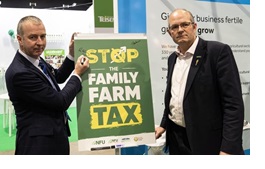 (RABDF Chair Robert Craig and NFU President Tom Bradshaw signing the Stop the Family Farm Tax campaign pledge board at Dairy-Tech.)
(RABDF Chair Robert Craig and NFU President Tom Bradshaw signing the Stop the Family Farm Tax campaign pledge board at Dairy-Tech.)
The dairy sector has showed its support for the NFU's Stop the Family Farm Tax campaign, with businesses adding signatures to our campaign pledge at Dairy-Tech, and processors, with a turnover of more than £7 billion, signing a joint letter to the Treasury to warn against changes to IHT.
The dairy sector has come together to support the NFU's calls for a pause to the implementation of the government's proposed changes to IHT (inheritance tax), and a consultation with industry.
The strength of feeling among the sector was showcased on the NFU's stand last week at Dairy-Tech, with visitors signing our pledge to Stop the Family Farm Tax.
NFU Dairy Board Chair Paul Tompkins said: "This is a clear message from the UK dairy sector that the government must take-action and work with industry to reduce the impact of this ill-advised policy. Dairy producers are already under extreme pressure from years of volatility, the impact of a changing climate, increased regulatory demands and the need to continuously invest in their businesses.
"This policy has far-reaching consequences across the whole industry and has already had a significant impact on producer confidence."
In a powerful moment of unification, more than 20 dairy processors have joined a coalition of co-signatories in a letter led by the NFU to Treasury highlighting the risk of scrapping APR and BPR (Agricultural Property Relief and Business Property Relief).
Speaking at Dairy-Tech, NFU President Tom Bradshaw said: "More than 20 dairy processors, with a combined turnover of over £7 billion, have joined 57 other businesses from across the food supply chain as co-signatories of a letter that has been sent to the Treasury highlighting the risk scrapping APR (Agricultural Property Relief) and BPR (Business Property Relief) poses to the long-term resilience of the sector.
"The letter demonstrates the economic importance of the UK food supply chain and the threat these changes pose to the long-term stability of the nation's food resilience. This is a clear message from the UK dairy sector that the government must take-action and work with industry to reduce the impact of this ill-advised policy." NFUOnline
|
|
|
UK - Rachel Reeves issued food security warning as war with farmers rages
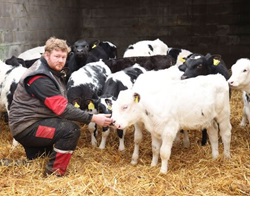 A farmer has warned that Rachel Reeves's inheritance tax raid threatens Britain's food security. Father of three Ben Aveling, 39, described feeling "attacked" following the Chancellor's October budget which heaped the levy on farmers. He said: "At the end of the day, the farm will be here hopefully for my children and that's what I'm fighting for personally. But my battle is for everybody."
A farmer has warned that Rachel Reeves's inheritance tax raid threatens Britain's food security. Father of three Ben Aveling, 39, described feeling "attacked" following the Chancellor's October budget which heaped the levy on farmers. He said: "At the end of the day, the farm will be here hopefully for my children and that's what I'm fighting for personally. But my battle is for everybody."
Ben added: "Farmers are resilient. We're a resilient bunch and we always find a way through. Initially I felt quite attacked by it. As time has gone on, I feel like British farming is being attacked. Our food security is under threat. We're only one lack of import, one Covid and one Ukraine war away from having no food shipped here. Imagine if we had no food here?
Ben, who promotes farming on social media, said: "There's a lot going on at the moment where people are using their children to say 'don't take my farm away'. As much as that's gut-wrenching for myself and my family, that's actually not the point. A lot of people out there don't have farms to give to their children and do have a house that they have to pay inheritance tax on.
"For me, it wasn't about 'oh look at what my children are going to go without', Selfishly, of course I feel that but that's not my battle. My battle is this is going to stop farming. If we're not careful, people will have to sell their farms. Even if some will need to sell part of it, it will leave the rest unviable."
Ben warned of the urgent need to avoid an increased dependency on foreign produce. He added: "When people eat their food three times a day, they don't even consider it's been made on a farm. Our mission is to try to appeal to the hearts and minds of the public and show them that it's not about us. I'm not trying to play a violin. I'm not trying to say you should prop up my family. It's irrelevant. Everyone eats and we need food in this country."
DailyExpress
|
|
|
UK - Research says 9 in 10 farmers say mental health is the 'biggest hidden problem'
New research from Farm Safety Foundation reveals that the levels of mental wellbeing among young farmers has been decreasing over the past four years.
This also comes as around 9 in 10 farmers (91%) agreed that poor mental health is the 'biggest hidden problem' facing the industry today.
Leading rural charity, Farm Safety Foundation (Yellow Wellies), are running their 8th annual Mind Your Head campaign, aiming to raise awareness of, and tackle the stigma around poor mental health in the industry. Recent research by the charity revealed that poor mental health among farmers and agricultural workers is deteriorating. In the sample of over 750 farmers, 9 out of 10 respondents (91%) agreed that poor mental health is the 'biggest hidden problem' facing the industry today.
There is no doubt that 2024 was a challenging year for farming in the UK and, given the added stress farmers are currently experiencing, ensuring farmers and farm workers prioritise both their physical and mental wellbeing has never been more important.
1 in 3 farmers (33%) who work more than 9 hours a day admit to having had an accident or a near miss in the past 12 months demonstrating the link between long hours and working safely. When mental wellbeing is factored in, the evidence revealed that farmers with lower mental wellbeing scores were significantly more likely to admit to working unsafely and risk-taking, something that raises alarm bells with the Farm Safety Foundation, especially as their research shows that the levels of mental wellbeing in those working in the industry have been steadily deteriorating over the past four years.
For more information on the Mind Your Head campaign please visit www.yellowwellies.org or follow them on social media - @yellowwelliesUK on Facebook, Instagram and X using the hashtag #MindYourHead.
|
|
|
UK - Farmers told to avoid phrase 'farmer's wife'
NFU Scotland report warns against using language that reinforces gender stereotypes. Farmers should stop using the phrase 'farmer's wife' as it reinforces gender stereotypes, the National Farmers Union (NFU) in Scotland has said. A new 'diversity and inclusion' strategy highlighted examples of language that had been heard at NFU meetings that it deemed inappropriate, including identifying a farmer as 'he'.
Arguing that 'the 'farmer' is not a man', the report said that they could be a woman and warned: "People in leadership positions need to use correct terminology. Don't use farmer's wife."
Among the other language that 'reinforces stereotypes and alienates particular segments' mentioned, was encouraging male farmers to attend the NFU's annual conference by saying: "Bring your wife, the shopping is great in Glasgow." The recommendations included developing a 'policy for strategy and language', and specifically 'ending certain words/phrases'.
The report also recommended a review of the union's code of conduct to include WhatsApp communication, arguing the messaging service was "being used for gossip, derogatory comments about staff or politicians and this should not be permitted".
Telegraph
|
|
| |
BRITISH DAIRYING
ENSURE YOU RECEIVE EVERY COPY
British Dairying is available by subscription at £70.00 posted to UK addresses,
£90.00 for Europe, £115.00 for the Rest of the world
or £30 +VAT for British Dairying Online only
|
|
|
QUOTE
"Happiness is when what you think, what you say, and what you do are in harmony."
"Live as if you were to die tomorrow. Learn as if you were to live forever."
Mahatma Gandhi, 1869-1948, lawyer, anti-colonial nationalist, and political ethicist
|
|
| |
|
|
|
You are receiving this email because you are a registered reader of British Dairying and we are pleased to send you extra information to supplement the journal.
|
|
|
British Dairying,
WB Publishing Ltd
Priory Cottage, Eastbourne Road Ridgewood East Sussex TN22 5ST
WB Publishing Ltd is registered in England and Wales, Registration No 2951727
|
|


 (RABDF Chairman Robert Craig, Kate Robinson, Alice Sault, Becky Yarnold (HA Dairy), Mark Frankcom, MD NMR.)
(RABDF Chairman Robert Craig, Kate Robinson, Alice Sault, Becky Yarnold (HA Dairy), Mark Frankcom, MD NMR.)


 The AHDB is seeking a dairy farm in Scotland to join its Strategic Dairy Farm programme. Farmers who are interested in driving innovation, sharing best practices, and confident in hosting on-farm and virtual events are encouraged to get in touch. Successful applicants will be appointed for three years and will have the opportunity to collaborate with industry experts on their chosen topics, encouraging peer-to-peer learning.
The AHDB is seeking a dairy farm in Scotland to join its Strategic Dairy Farm programme. Farmers who are interested in driving innovation, sharing best practices, and confident in hosting on-farm and virtual events are encouraged to get in touch. Successful applicants will be appointed for three years and will have the opportunity to collaborate with industry experts on their chosen topics, encouraging peer-to-peer learning.
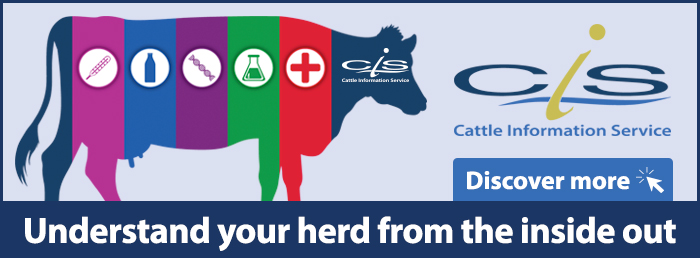
 (RABDF Chair Robert Craig and NFU President Tom Bradshaw signing the Stop the Family Farm Tax campaign pledge board at Dairy-Tech.)
(RABDF Chair Robert Craig and NFU President Tom Bradshaw signing the Stop the Family Farm Tax campaign pledge board at Dairy-Tech.)
 A farmer has warned that Rachel Reeves's inheritance tax raid threatens Britain's food security. Father of three Ben Aveling, 39, described feeling "attacked" following the Chancellor's October budget which heaped the levy on farmers. He said: "At the end of the day, the farm will be here hopefully for my children and that's what I'm fighting for personally. But my battle is for everybody."
A farmer has warned that Rachel Reeves's inheritance tax raid threatens Britain's food security. Father of three Ben Aveling, 39, described feeling "attacked" following the Chancellor's October budget which heaped the levy on farmers. He said: "At the end of the day, the farm will be here hopefully for my children and that's what I'm fighting for personally. But my battle is for everybody."
